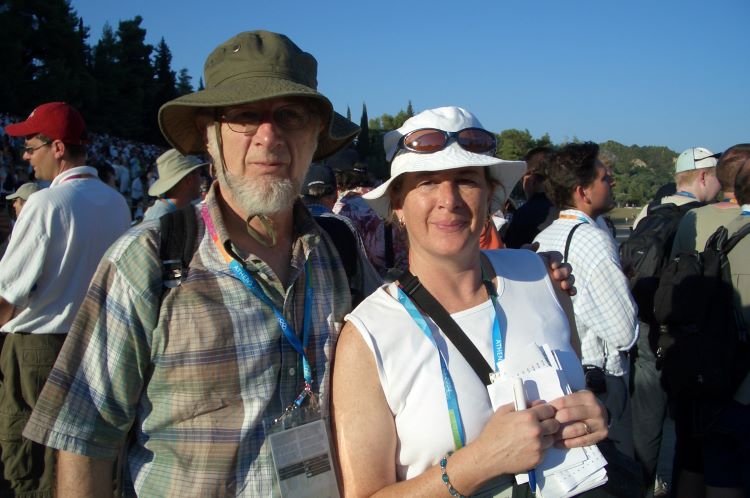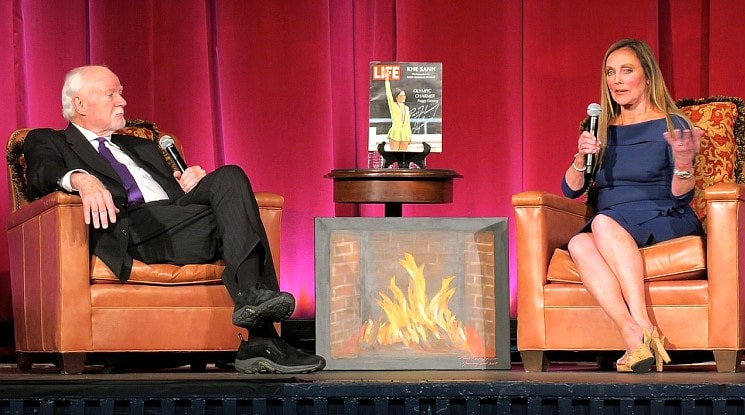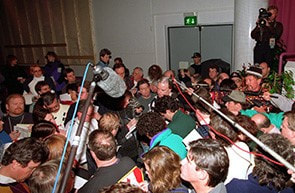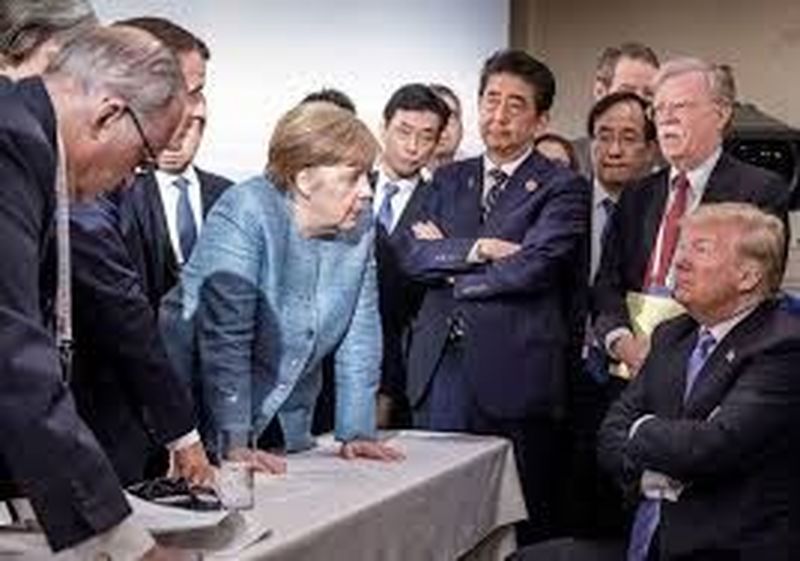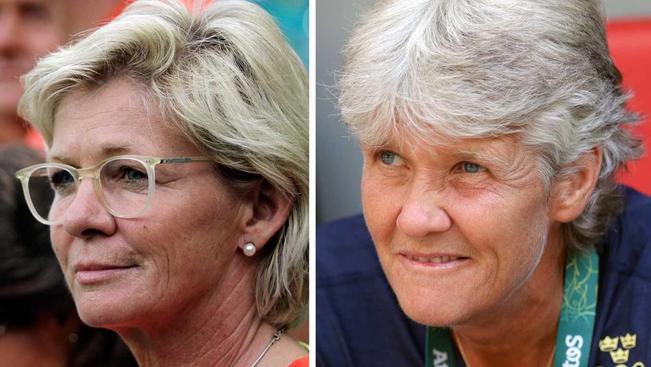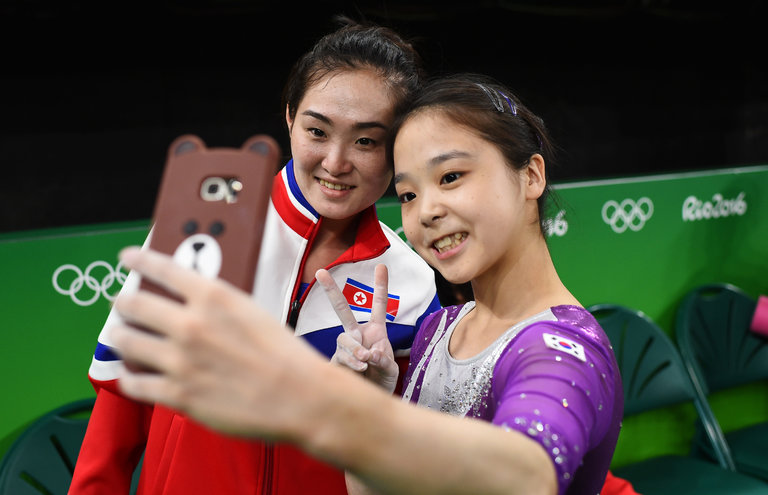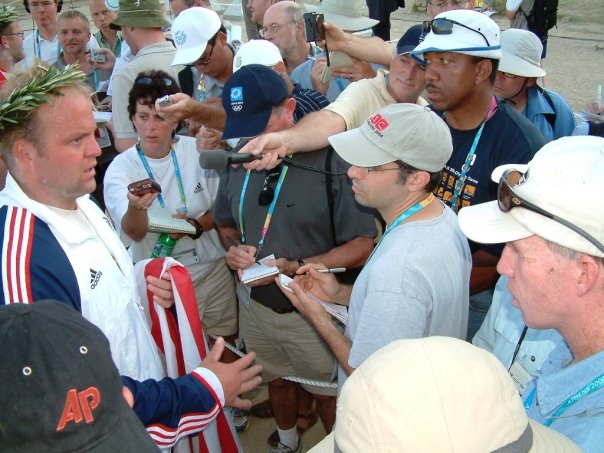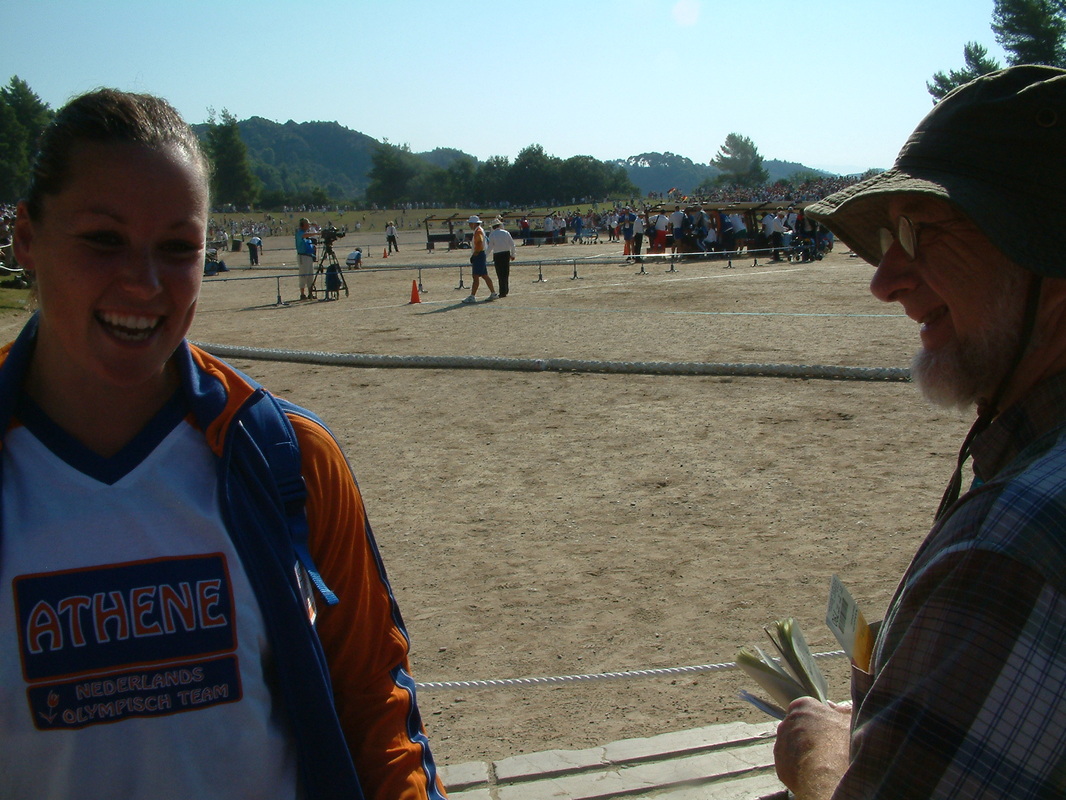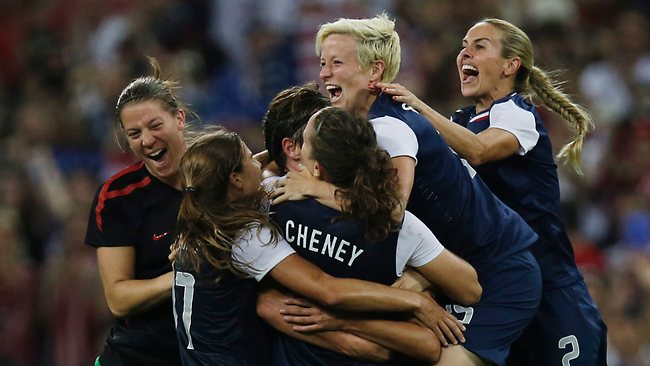|
The other day I was writing about Dominic DiSaia, and his photo of Vin Scully, and I mentioned photographers I ran around with, back in the day. One of them is John McDermott, who bonded with me on the soccer beat and also at the 1994 Winter Olympics in Norway. Speaking Italian fluently, John charmed our way into the Italian hospitality tent up on an icy mountain plateau, by offering some of my NYT souvenir pins (“distintivi”) -- pure gold at the Olympics. The food was great, as one might expect, and so was the scene when Alberto Tomba, three-time Olympic gold medal ski racer, slowly checked out every table, like an entitled don in one of the Coppola masterpieces. (Oh, yes, that was Roberto Baggio's voice on John’s cellphone.) John McDermott – originally from Philadelphia -- gets around; he loved San Francisco for decades, riding his bike and hanging around with locals like Dusty Baker, but six years ago he moved to Italy with his wife, Claudia Brose, originally from Cologne. They live in Appiano, in the northeast corner of Italy, where German and Italian intermingle, but lately the couple has been making forays to Naples for the ambiance. Claudia has a business conducting photography seminars, and John demonstrates the art of street photography in one of the most vital cities on earth. In Naples – Napoli --- English or northern RAI broadcast Italian only go so far, but in Napule life is often conducted in Neapolitan, not so much a dialect of Italian as a Romance language, endangered, to be sure, descended from Latin. John enclosed a link to a video he put together, using his photographs, backed up by the song by Pino Daniele raised in the Spaccanapoli district, who died in 2015. What draws John and Claudia back to Naples? "The warmth, energy and openness of the people, the chaos and the way everything just works out," John wrote the other day. I get it. My first foray to Naples was in 1970 when my wife and I took our three young children around Italy, the most child-friendly country I know. I went back in 1989 to work on a Times magazine feature on Diego Maradona, the Argentina soccer star who played for the Napoli club – a perfect spot for the flawed athlete. Maradona defied the club’s attempt to set up an interview, even when the club driver took my to Maradona’s villa at the top of the old Greek hill area, Posillipo. I called the number I had for him and somebody messed with my mind, leaping from Spanish to Italian and back. And when I went to a club practice Maradona did not show up that day, leaving his coach sputtering and fuming. Tough town. I realized this at the Napoli club match that Sunday. As I made my way to the press tribune, my guide nudged me under the overhang – just before a wadded cannonball of wet tissue splatted against the wall, like a baseball, where I had been standing. The “ultras” in the stands surely had good aim. Next time I visited Naples was at the 1990 World Cup when Argentina was defending its 1986 title. While I was working, my wife meandered down to the harbor, with life pulsing in the shops – at least until a couple of older ladies wagged index fingers and warned, “Signora, Signora,” and motioned for her to hide the bracelet on her wrist. The local lads were quite adept at snatching jewelry from tourists, they signalled. The pre-teens of Naples are known as “scugnizzi” – urchins – a matter of civic pride. Sit at an outdoor café and a scugnizzo will try to sell a few loose cigarettes, as a way of getting closer. Oh, yes, tough town. Maradona, local hero, played to the Napolitani by urging them to root for his Argentina team when it played Italy in the semifinal. His words, as John McDermott recalls them, were, “364 days a year they call you “terroni” -- an Italian pejorative term for southerners. “Today they want you to be Italian. Don’t be fooled by them. We are your team! You belong with us!” Maradona’s brazen appeal was rewarded with a victory over Italy, but Argentina lost the final to West Germany. He’s gone, now, a victim of his excesses, but Diego Armando Maradona is the flawed patron saint of Naples. As John and Claudia wander through the tangled, pungent streets, they see his likeness everywhere -- the man who found his spiritual home. 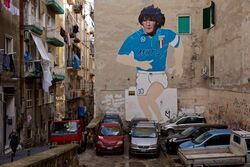 “It’s dirty and chaotic and sometimes nerve-wracking,” McDermott wrote me. “But it is also a constant, vibrant, non-stop show of real life lived out in public.”
John expands on his love for Naples in this link: https://aphotoeditor.com/2022/04/14/the-art-of-the-personal-project-john-mcdermott-2/ As I work my way through John’s photos, I can hear, can smell, and surely can see the pulsing life in the alleyways of Naples. *** Long live the photographers who take us to these places. *** The NYT – the former gray lady – now lavishes color photos on its subscribers. Did you see this recent masterpiece on Budapest? https://www.nytimes.com/2022/08/15/travel/budapest-hungary-memories.html The 2020 Tokyo Olympics have already begun -- a year late and quite unwisely.
The American women soccer team got blasted by Sweden, 3-0, on Wednesday in Japan, in some early tournament action, before the Opening Ceremony Friday night. So now the Games are official – gritting their way toward the finish line, in the face of a worldwide pandemic that humans of all nationalities and political systems have been too stupid to control. This has been evident as the International Olympic Committee and the Japanese organizers willed the Games to begin, despite another surge taking place. Athletes are already testing positive – and this is before they were shoe-horned into a dense city, into Olympic hideaways where athletes are theoretically sequestered. But why should the IOC and the hosts show sense when most of the world is giddy on the concept that we are back to “normal?” I already agree with the skepticism collected by the great reporter, John Branch, in the NYT this week. Branch talked to observors around the world, who wondered if it is time to end the Olympic Games. https://www.nytimes.com/2021/07/17/sports/olympics/tokyo-olympics.html After covering seven Summer Games and four Winter Games, from 1984 into 2010, I was veering toward the position that the Games existed mostly because of television money, blaring commercials around the world, but costing far more than they generate for the host countries and victimized host cities – all in the name of a faux ideal. I know I became disenchanted with the Olympics when I saw cities and entire countries disrupted by the demand for specialized Olympic facilities. After the two-week festival, the traveling circus packed its tents and moved on, it mostly left the detritus and debt behind, as documented in John Branch’s article. My first Games were in 1984, when Los Angeles and top executive Peter Ueberroth used existing facilities in the region, producing a profit for amateur sports groups, not debts for the host region. Some other host cities tried to think of leaving a lasting upgrade – Barcelona, in 1992, for example, and to my surprise, Atlanta's downtown was upgraded by the Olympic presence -- but others just spent and spent for a 17-day jamboree. Having said that, I must add that some parts of the Olympics were wonderful to cover – great events intriguing personalities, in special places all over the world. I always tried to keep my perspective of whether these Games had lasting value for the cities that lusted to be the host, but I do have memories of events and competitors: In Los Angeles in 1984, I had the good luck of watching a charismatic American volleyball team, with a lanky, thoughtful star named Flo Hyman, lose the tense gold-medal match to China. For me, that one tournament was as good as any sports playoff or tournament I have covered. My first Winter Games – Calgary, 1988 – reminded me that I don’t like being cold, so I gravitated to events with a roof over them, like figure skating….and hockey…and speed skating, with rocking music and gaudy costumes as powerful athletes whizzed around the oval track. The Olympic ceremonies often had the air of ersatz royalty – coronations! knighthoods! weddings! – but once in a while they touched the heart, as in 1996, in Atlanta: the final carrier of the Olympic torch, on a runway high above the stadium, turned out to be Muhammad Ali, already suffering from the Parkinson’s disease that would kill him way too young. We held our breath and prayed for him, as Ali willed himself to complete his mission. In those same Atlanta Games, in the first Olympic soccer tournament for women, epic Americans like Michelle Akers, Julie Foudy and Mia Hamm won the gold medal. In 2002, in Salt Lake City, Sarah Hughes, not yet 17, blended talent and will in her stunning gold-medal figure-skating routine. I had written about her family, John and Amy Hughes and their five other children, good people, who lived near me on Long Island. Sarah Hughes is now a lawyer in New York City; her dad, John Hughes, a great hockey player from Cornell, passed in August of 2020. I admit, I often slipped out of the Olympic bubble, to see how real life was going on in the host nation. At the 1998 Winter Games in the modest Japanese mountain town -- Almost Heaven, West Nagano, as I called it – I watched residents sweep overnight fluffy snow off the sidewalks. In Athens in 2004, my wife and I played hooky one day, taking the slow ferry to Hydra and swimming off the rocks. In Beijing, Chris Clarey and Jennifer 8 Lee and I visited one of the old neighborhoods – a hutong – and ate in a restaurant run by Uighurs, the persecuted ethnic minority. But maybe my best “Olympian” moment came in 2004 when the shot-put competition was held on the grounds of the very first Olympic games in 776 BC, in the Olympia region west of Athens. To inhale that dust was a grand honor. Since I retired at the end of 2011, I admit, I have never watched a minute of Olympics Games, Winter or Summer – too much babble, too many commercials, too much else going on. In the next few weeks, I will rely on the NYT’s great staff to provide the words and pictures --- and I hope everybody gets through without calamity. Mike Moran was one of the giants in sports – a spokesperson for the United States Olympic Committee for decades who told the truth either with facts or with a sardonic tone and a pronounced rolling of the eyes. He was “in the room” when the 1980 Miracle on Ice transpired, and he was there when Nancy Kerrigan was whacked and when Tonya Harding was allowed to skate in Norway and he was there to explain the grandiose statements of George Steinbrenner and other bumptious officials passing through the hierarchy.
Mike was the Deep State of Olympics, and thank God for that. He passed on Tuesday at the age of 78 after a sad few months of feeling himself go downhill. He stopped e-mailing political columns and other snarky writings by others, and that was a dire sign. I could go on, but other people knew him better than I did. One of them is Bob Condron, one of the best people I know in sports, himself a professional publicist and great company in some Olympic site. Bob went on Facebook to extol his boss and friend, and I am going to desist right here and let Bob tell you about Mike Moran: By Bob Condron: A friend of mine died today. He was the library of the Olympics, as it pertained to the United States. He was the spirit of what good there was in having Olympic Dreams and reading and hearing about them. His name was Mike Moran, the spokesman of the U.S. Olympic Committee who guided the organization’s mindset for a quarter century. He was my boss. He brought me from college athletics into the Olympic Movement and my life was so rich for 30 years because of it. Mike had a variety of titles: editor of the Olympian Magazine, director of communications, Chief of Communications Officer, whatever. He came at a time the U.S. Olympic Committee had just formed by an act of Congress. The USOC was a Park Avenue kind of Travel Agency in New York. But, the Amateur Sports Act of 1978 changed all that. And it came to Colorado Springs. And its headquarters was at the old ENT Air base, the new Olympic Training Center just off downtown. Baaron Pittenger and Col. Don Miller talked Mike into coming to the USOC from the University of Colorado where he was the sports information Director. A football power with Mike riding the Buffalo wave. The USOC organization was new, the training center was new, the attitude was new. And Mike changed his life and he launched a new philosophy of trying to get the media to pay attention to the Olympics and the athletes of the United States who had dreams. He built a foundation in the early days to make sure the American media had a contact, someone who cared about small hometowns of athletes, the colleges they came from, the stories of their lives, coaches, moms and dads. But, Mike became more than that. He was the guy who stood at the podium when the U.S. boycotted the 1980 Olympic Games in Moscow. His heart broke because of it and the nastiness that came from the powers to be in the Carter administration. And he was at the podium when there was Payback four years later when the Soviet Union and the Eastern bloc said NO! to Los Angeles and the 1984 Olympics. And he was the man in the TV lights when Nancy Kerrigan was whacked in the kneecap by the Tonya Harding camp at the Olympic figure skating trials in Detroit before the 1994 Olympics in Lillehammer. He called the 1 a.m. press conference in Norway with 1,600 media in a space that probably seated 500. He was the man at the Podium for all kinds of calamities for the USOC: possible bankruptcy, investigations that wanted to make the USOC a farm club of Congress, Drug busts, George Steinbrenner, drug positives, athlete deaths, fake bios of USOC leaders, conflicts of interests by officers…fun stuff. He’d take the podium, the lights, explain things and might say…”we need to do better. Can I answer any questions?” And a hundred waving palms would rise into the air, blood vessels enlarging, right to know things, screaming at Mike. He was calm on top. Paddling like crazy underneath. But he stayed the stay. Answered every question. Met for one on ones later. He was accessible, he was the man with the quotes. Sometimes with leaders. Sometime without. Stuck on an island. He was the man who set the standard for the USOC of old. The man the media depended on to be available…at that moment. No matter whether it was the New York Times, USA Today or Bonnie Blair’s hometown paper in Wisconsin. He made this profession proud. He made me proud. He made this nation proud. He’s pain free now. Not lonely from all of his mornings at the coffee shop with six papers all prohibited by this god-awful pandemic. The poison in his body from pneumonia and organ shutdown is gone. . The 6-4 body of a former AAA pitcher that once hit Curt Flood in the family jewels as a member of the St. Louis Cardinals is forgiven. At least by God. After l:37 pm. Tuesday, he’s reading the papers now. Having coffee. Wishing the Colorado Springs Sky Sox was still a farm club of the Rockies. Writing to all the media who might have gotten credentials in Heaven . And waiting for us. * * * * * * A reporter's appreciation of Mike Moran, by Phil Hersh, long-time Olympic correspondent : http://aroundtherings.com/site/A__100353/Title__Media-Matters-Colleagues-Recall-Mike-Moran/292/Articles  432 Park Avenue offers a digital New York salute 432 Park Avenue offers a digital New York salute The hissy fit by Amazon reminds me of one of the best things that has happened to my home town -- not getting the 2012 Summer Olympics. This happened in 2005, when the City Council voted down a stadium that would have been plopped down on the far west side of Manhattan to accommodate the Typhoid Mary of sports events. Since the Games were given to London, the Hudson Yards area of Manhattan has grown, without having to work around a neighborhood killer of a stadium. I say that as a sports columnist who was a very early critic of the proposal. My memory was just jogged by the rising up of people who resented the $3-billion tax benefits to be given Amazon, which wanted to build a “campus” in the Long Island City section of Queens. Rather than negotiate with critics – show some respect for the locals -- Amazon turned tail and ran. The political aspects have been well reported in the Times and elsewhere. Experts and business people say Amazon really would have meant 25,000 new jobs in the city, but I say they would have been jobs for new people, out-of-towners, with technological skills, eager to pay the gouge prices in new high rises in formerly lumpen Queens. As David Leonhardt points out, Queens already has jobs: https://www.nytimes.com/2019/02/17/opinion/amazon-new-york.html As a native of Queens (who lives just to the east these days), I love the boom all over my home borough -- the languages and energy and skills and food: Oaxaca restaurant in Corona; Korean restaurants along Northern Blvd. I’m not sure Queens needs the great favor Amazon was going to bestow. Many people living near the proposed “campus” would have been displaced by the land rush and the rent-grubbing and the price-raising. (See: “Brooklyn, hipsters.”) To Jeff Bezos, I would say a few things: 1. Thank you for the Prime delivery of a 64-ounce container of kitchen-drain cleaner rather than my having to run to the store during the deep freeze this month. 2. Please, keep reporting on that disturbed person in Washington with your wonderful paper, The Washington Post. 3. When local activists express their concerns, please, learn to negotiate. This is Noo Yawk, for goodness’ sakes. (“If I can make it there, I’ll make it anywhere.” Guess you didn’t.) 4. And while I think of it, please read your own paper’s electronic files about the stupidity of people who take intimate selfies. This uprising by “progressives” – whatever that means – seems to have come as a shock to Gov. Cuomo and Mayor DiBlasio (who keeps changing his story, as in his 180-degree swerve in the Times on Monday.) I would give some advice to these illustrious public servants. (The same would apply to former mayors Bloomberg and Giuliani.) 1. Fix the damn subways first. Help working people get to work. 2. Pay attention to the rising seas, because the disturbed President has no clue. 3. Pay attention to those dreaded “progressives.” These guys are always running for President rather than fixing New York. They need to know that New Yorkers don’t like out-of-towners telling us what the deal is. Jeff Bezos, say hello to the New York Echo: Visitor: Hello-o-o-o-o! New York Echo: Shut the f--k u-u-u-u-p! ------ *-Homage to the greatest headline any of us will ever see, written by William J. Brink, managing editor of the New York Daily News, when President Ford did not help the city during the 1975 financial crisis: FORD TO CITY: DROP DEAD. The delegates of FIFA have voted, early Wednesday, to award the 2026 World Cup to a combine of the U.S.A. and its dear, highly-respected neighbors, Canada and Mexico. The United group defeated Morocco, 134-65, thereby rendering moot the concerns that delegates would be swayed by disdain for Goliath and its current president, or respect for the African bidder, or the grand old FIFA tradition of packets of (American) dollars. There was a last-minute appeal by dignified Moroccan supporters, speaking up for the vast love of soccer in Africa, the supply of African footballers being recruited by the fast leagues of Europe, the worthiness of the Moroccan bid, and the fact of Africa as the birthplace of civilization. But the three North American nations won. I must note that I heard about the possibility of a tripartite World Cup many years ago from Sunil Gulati, the former president of the U.S. federation. Gulati deserves some of the credit for this success, which took place with a new American president spewing contempt for its closest neighbors. This is what I wrote before Wednesday's vote in Moscow: * * * Any vote in the soccer federation known as FIFA is always suspect, given the history of blatant bribery that let to Russia being host to the looming World Cup and that soccer power of Qatar being the host in 2022. Qatar! The new leadership of FIFA keeps insisting it has cleaned up the influence-peddling scandal that extended to American officials including the late Chuck Blazer in his lair in the Trump Tower, and who knows who else. FIFA is continuing its money-grubbing tradition by expanding future World Cups to 48 teams (perhaps the U.S. will then be able to qualify) and by considering lucrative club tournament Cups that would put the well-paid players on a faster, longer hamster wheel of games and travel, injury and early disintegration. The FIFA home office has released a technical survey showing that the North American group – henceforth known as The Three Amigos – is vastly superior to the Moroccan bid in little details like stadiums, infrastructure, soccer expertise, money-making potential. But, as in the United States these days, facts and studies and information are not always considered. First, do not emphasize the grand old FIFA tradition of envelopes stuffed with dollars going to delegates in return for their votes. Second, by exquisite coincidence, the vote takes place at the same time the U.S. has gone rogue, electing a disturbed person as president. While the leader of the fact-free world is blustering in Singapore, the delegates to the FIFA will gather in Moscow on Wednesday, June 13, to choose the 2026 host. Sports federations have voted on the U.S. in the recent past. The International Olympic Committee voted for the Olympic host, and to some degree New York (2008) and Chicago (2012) were judged in the wake of President George W. Bush’s blundering into the invasion of Iraq in 2003, thereby throwing the world into chaos. The I.O.C. delegates – generally of a far higher caliber than the avaricious voters from tiny countries in FIFA – saw the smoke emitting from the Middle East and witnessed the dead and the migrants and voted for London and Rio – reasonable votes, producing memorable Olympics, no quarrel there. But the U.S. never had a chance, given its image as a Goliath-gone-mad. Now the FIFA delegates – a far more rank kettle of fish -- used to selling their votes -- get a chance to judge kick the most powerful member of the soccer troika. Tethered to an ignorant bully are Mexico – vilified by the U.S. president for its migrants who help make the U.S. work – and Canada – charged with burning the White House in 1812, its leader described as “weak.” Forget the lopsided technical evaluation. Overlook the grand FIFA institution of bribes. Morocco’s best chance for staging the 2026 World Cup would seem to be that its chief executive is not named Donald J. Trump. * * * NB: The NYT reports that President Trump has sent three letters to Gianni Infantino of FIFA assuring that the restrictions for visiting the U.S. would not be enforced on well-heeled tourists to a potential 2026 World Cup. See article: www.nytimes.com/2018/06/12/sports/trump-letters-world-cup.html It all comes back to me as my colleagues prepare to cover the 2018 Winter Olympics up near the border in South Korea.
Having visited the DMZ with the U.S. soccer team in 2002, I think about hordes of crazies streaming across the border with axes in their hands. At the moment, I read there is a norovirus loose in the Olympic complex. How’d you like to get frisked by a security guard, looking a little green? There is always something. That’s why the New York Times always sends journalists who know Olympics sports but can handle anything. They have a dream team going this time – many of them colleagues from when I was covering Summer Games from Los Angeles in 1984 to Beijing in 2010, with four Winter Games included. Fear and trembling. A rebellion in South Korea brought down the government in 1987 and sportswriters were urging that the Olympics be called off. The Games were fine and I fell in love with the country. Fear and trembling. Atlanta was going to be a disaster, payback for over-reaching. There was indeed a bomb in the park one night, killing two people and injuring others – the work of one of our home-grown anti-government nutters, not foreign terrorists. It was awful. Our reporters were roused from our rooms and the editor Kathleen McElroy dispatched The Three Todds from Georgia Tech to drive us downtown in the NYT vans. Dave Anderson and Frank Litsky and others walked the street in the darkness, collecting details. And Atlanta came through the tragedy. Fear and trembling. Athens in 2004 was the first set of Games since 9/11. The fear was that terrorists were going to infiltrate Piraeus Harbor and blow up cruise ships. The worst violence was a domestic demonstration; our photo editor Brad Smith took a rock in the head and lived to tell the tale; (saw him the other day.) Juliet Macur was on the front lines and whiffed some tear gas. She’s in Pyeongchang, a columnist now. These are tough people. They don’t just keep score at games. http://www.nytimes.com/2004/08/28/world/the-reach-of-war-olympics-3-hurt-in-athens-protest-of-powell-s-visit.html (May I digress to mention the San Francisco earthquake during the 1989 World Series? We all did some instant reporting; the dogged Murray Chass reported from the pancaked Bay Bridge. http://www.nytimes.com/1989/10/19/us/california-quake-highway-collapse-desperate-struggle-for-lives-along-880.html A day later the NYT sent out a great news reporter who arrived with his boots and a helmet with a flashlight. Dude, we said, The City is making the cappuccino by candlelight.) I don’t remember any fear and trembling heading to Almost Heaven, West Nagano, for the 1998 Winter Games. Soba noodles in downtown booths. Peaceful Games. But one night I went to sleep feeling fine and came down with a raging flu. I went downstairs to the press-center infirmary to see a long line of similarly stricken colleagues. The medics put some vile-tasting grainy medicine on my tongue and said I might sleep for a day. Wonder drug. I was back on the job a day later. The Japanese took care of us. Back to the daily dose of soba noodles. So now I am retired, back home. I tend not to watch Olympics on TV because I had my fun covering them, being there. But I will be reading what Jeré Longman and John Branch and Juliet Macur and all the rest will write in the New York Times. The other day, Andrew Keh arrived (from his post in Berlin) and wrote about discovering familiar Korean comfort food in that northern outpost: https://www.nytimes.com/2018/02/02/sports/what-is-pyeongchang.html I’d like to think I would have written a story like that. The beat goes on. American boorishness is not confined to domestic usage. We export a good bit of it, too.
I am thinking here of the disgraceful behavior of Ryan Lochte and Hope Solo in the past two weeks. Lochte apparently has spent so much of his life in chlorine that it has pickled his brain. He did not realize Brazil just might have security cameras that would detect an Olympic celebrity with dyed light blue hair after he and three pals claimed to have been robbed at gunpoint. (It appears they broke into a restroom. Geniuses.) Solo indulged in unsportsmanlike whining after the American soccer team was defeated by Sweden, calling her opponents “cowardly” for their conservative tactics. Solo was detracting from Sweden’s coach, Pia Sundhage, who used to coach the Americans. The Swedes lulled the quicker, more potent Americans into forays, and then struck on the counter-attack. But let’s pass over the two loutish athletes and concentrate on the women’s final Friday as Germany outlasted Sweden, 2-1, to win the Olympic gold medal. Women’s soccer has only been in the Olympics since 1996, and this was the first time two female coaches had reached the finals – Silvia Neid of Germany and Sundhage of Sweden, both of whose athletic sideline prowling and grayish manes allow me to use the word “leonine.” Sundhage is one of the really cool coaches I have ever met. Sometimes to loosen up her players she will emit a folk song. When the U.S. beat Brazil, 1-0, in the finals of the Beijing Olympics in 2008, the press prodded her to sing Bob Dylan. She obliged with a quickie from “The Times They Are A-Changin’.” I have a personal short list of coaches I would like to have played for, if I were an athlete, that is -- Gil Hodges in baseball, Al Arbour in hockey, Dean Smith in basketball and Herman Edwards in football. (Edwards is a guru who earnestly tried to teach doltish reporters to trust our own faculties. He had a mantra: “The eye/Don’t lie.”) A decade ago, I expanded my list to include Sundhage, the wandering Swede, who was coaching the Americans, quite successfully. It annoyed me when Solo made a spectacle of herself by asking for replacement keeper gloves when Sweden had a chance to clinch with the next penalty kick. The Swedish kicker converted, anyway, and soon Solo ripped Pia’s hunkering tactics, which have merely won championships. I saw Italy’s men win the 1982 World Cup by using an updated version of the catenaccio (the bolt, or chain, in Italian) defense – tight back line, and counter-attack when an opening presents itself. "Let's inspire, let's be badass, let's be fierce, let's be competitive,” Megan Rapinoe, the artful American winger, told NBC the other day. “But we're gracious and we're humble, and we play the game a certain way, whether we win or lose." Rapinoe added, “And we've been on the winning side quite a bit, and when we find ourselves on the other side, we need to handle that graciously, and unfortunately that wasn't the case." Sweden lost as Germany, looking fresher and faster, scored once, pressured an own goal, and then hung on defensively (would Solo say “cowardly?) Now the question is, what does the footloose Sundhage do next? Recently, Henrik Rydström, a member of the Swedish national men’s squad, suggested that Sundhage would make a fine coach for his team. A reporter asked Sundhage whether a woman could really coach a national men’s team. Her response, in Swedish, as translated by Business Insider: “Well, then, let me ask you a question. Does it work with a female chancellor in Germany?” Pia then spelled it out for reporters: “Angela Merkel” (is running) an entire “f------ country. Clearly it works.” Clearly, female coaches work for female players. And let me throw this out: there is another country that seems 88 percent likely to elect a female President in November. One of these years, Juergen Klinsmann will move on. Pia Sundhage should be on the short list. Plus, she already knows our folk songs. (The Silva family lives in the Copacabana section of Rio. He is a writer....and a Yankee fan....and my friend. I asked Altenir to write something he was sensing about these Olympic Games, taking place all around them.) "Yes, We Have Problems” By Altenir Silva Rio de Janeiro is a divided city in its complexities. There are two sides in Rio de Janeiro and we can put these terms in a musical context: the sadness of Bossa Nova and the happiness of the Samba. The Rio of "Bossa Nova” is a movement musical that shows the soul of existence of the middle class on the ways of sadness. There's a poem by Vinicius de Moraes with a melody by Tom Jobim, "Tristeza Não Tem Fim; Felicidade Sim” (Sadness Doesn’t End, Happiness Does) that shows the broken heart of Bossa Nova, formed by composers who lived in the South Zone of Rio, a rich region. And there's a Rio of Samba, our African musical heritage, where the music is sung with joy about the heartaches and the cultural characteristics of the place. Samba has its origin in the North Zone and the favelas, which are poor regions, but with a great vocation to be happy. There’s a samba that is very meaningful by songwriter Zé Keti, “A Voz do Morro” (A Voice of the Hill) that says on its verses "I’m samba; I’m native from here, from Rio de Janeiro; I’m the one who brings joy to millions of Brazilian hearts”. Even in different contexts, the Bossa Nova is a softer way of singing and playing Samba. The Olympic Games in Rio are happening on this musical equator: for one side is the image of a city that is all right, but is sad because we know that this city is temporary - it finishes after the Olympics Games. This city is Bossa Nova. There's a Rio of Samba, where the people know that this feast isn't made to them, but they are being happy because they believe that the glee is the matter of the soul. The life is difficult and the smile makes it bearable. The paradox is our essence: the Brazilian smiles to not cry. All the world knows that there’s a breakdown of the State of Rio de Janeiro and the City Hall as well. This real city is out of our media, but has been shown relatively in the international media. Anyway, we have to take advantage of this unique moment in our city and sing the song of Braguinha & Alberto Ribeiro that was sung by Almirante: “Yes, We Have Bananas.” Now the song is: “Yes, We Have Olympics Games," also. --------------------------------------------------------------------------------------------------------------------------- Roger Cohen, who has lived and worked in Brazil, finds the positive side of Rio's hosting the Games: www.nytimes.com/2016/08/16/opinion/brazils-uplifting-olympics.html?hpw&rref=opinion&action=click&pgtype=Homepage&module=well-region®ion=bottom-well&WT.nav=bottom-well -------------------------------------------------------------------------------- Works by Altenir Silva: http://www.imdb.com/name/nm0993971/bio?ref_=nm_ov_bio_sm Links to the music Silva references: A Felicidade - Tom & Vinícius: https://www.youtube.com/watch?v=RtOLSXFf_MA Yes, Nós Temos Bananas - Braguinha & Alberto Ribeiro: https://www.youtube.com/watch?v=Ou_N7ajW96I A Voz do Morro - Ze Keti: https://www.youtube.com/watch?v=1DHN0O3ObPA Michael Powell's excellent column on the favelas: www.nytimes.com/2016/08/15/sports/olympics/rio-favelas-brazil-poor-price-too-high.html?_r=0 The two Korean athletes’ selfie in the Olympic Village – now flashed around the world -- reminds me of another Korean gesture for common humanity.
It happened at the 1988 Summer Games in Seoul -- the first nearly complete set of Games after the American boycott of the 1980 Games in Moscow because of the Soviet invasion of Afghanistan and the inevitable Soviet payback at the 1984 Games in Los Angeles. After the futile boycotts – making athletes pay for the failures of nations -- the two behemoths were back in the Olympic business in 1988. Just before the games began, I was at a reception at the media center. Koreans are more than generous in plying visitors with food, drink, gifts – and fellowship. (“They remind me of my relatives in Brooklyn,” a news-reporter friend of mine said. “They get up close to you, and they laugh and cry.” He loved them for it.) At this reception, a South Korean host mingled among the visiting journalists and spotted an American (me) and a Russian, both alone, both within arm’s length. He hooked one arm around me and his other arm around the Russian. "We should all be friends,” he urged us. “Come on, shake hands.” The Russian was as bemused as I was. I had no issue with Russians – had been in Moscow in 1986 for the Goodwill Games, midsummer, warm hearts, leaving me with a permanent affection for the people. But, geez, two journalists at a reception? Two strangers? A handshake? Really? The guy looked at me, and I looked at him, and he gave a very Russian shrug, and I did my best to imitate, as if to say, “что вы говорите” – whatever you say. We shook hands, I think the Korean took a photo, and we retreated to separate corners of the hospitality tent. Enough freaking brotherhood for one evening. Now I wish I had the photo, but that was before the age of digital. Nowadays, a North Korean and South Korean athlete meet in the village and take a selfie. Somebody else takes a photo of them. It goes around the world. We all take heart in this. Now we learn the North Korean athlete’s story is a bit more complicated. The latest article includes the phrase “coal mine.” But bless the people who care. Two of the most touching columns I have read about these Games were written by Roger Cohen and Frank Bruni in the Times. Cohen described the spiritual journey of an Egyptian volleyball player who wore a hijab in competition. (I don’t know anybody who writes better about Islam in the modern world than Cohen.) Bruni wrote about the high points of competition that made him cry. (I’m going to sound like a jerk, but my memories of Michael Phelps and swimming events at previous Olympics bring back a strong whiff of chlorine, not much else.) I do remember grand moments, many outside the arena -- like a warm-hearted Korean urging me to put down my little dish of kimchi and shake hands with a Russian. The International Olympic Committee has turned itself into a reality show. For money and approval from the networks, it has pushed one of its oldest partners off the island. The shameful ban of wrestling after the 2016 Summer Games is the next logical step since admitting professionals in the 1990’s. Once the Games opened the door for Dream Team basketball types and Grand Slam tennis stars, there was not enough room in the village for old friends like wrestling, which has merely been around for over 2700 years. Wrestling is a great sport. I covered it for years early in my career, had great respect for the training and intelligence of the athletes. It is also a sport for various body types. The I.O.C. dumped it over the side. In all its sanctimonious self-promotion, the I.O.C. cites history. But now it is clear. Under Jacques Rogge and his masters from the networks, nothing is sacred. They are not caretakers for so-called Olympic sports. They are hucksters on the corner saying “check it out, check it out.” I realized that in 2012, the first time I ever watched the Olympics on television after a childhood of following baseball and a working career of being at the Olympics. When you cover the Games, you don’t watch canned network television. Instead, you eagerly choose to spend a day in the blessed company of weight-lifters and fencers and wrestlers, the odd sports you never see from year to year, but love when you get around the true believers. The I.O.C. was always prattling about being caretakers of these sports, but they were lying to us. I also noticed in 2012 that the television production involved an endless loop of women’s beach volleyball, the same shot, from a camera held close to the sand -- legs and butts and swinging ponytails. Sure, beach volleyball is great competition among real and deserving athletes, but the I.O.C. was telling us something: it will scuttle old friends, with no conscience. Think of that when they come around again. I didn’t mean to write this long, but I got carried away. For the real inside look at wrestling and the Olympic movement, please read the column by Mike Moran, the long-time spokesperson for the United States Olympic Committee, still the repository of conscience and tradition. Over to Mike: http://www.coloradospringssports.org/index.php?option=com_content&view=article&id=612:68-mike-morans-commentary&catid=46:blog&Itemid=97 It all comes back to me now – the heat, the dust, the antiquity, the frustration when Adam Nelson could not prevent his foot from squiggling over the foul line.
By the slimmest of margins, Nelson fouled on his final shot in the 2004 Summer Games, which meant somebody else won the gold medal by virtue of a tiebreaker. Nelson had two millenniums of history all around him on the most memorable day of the entire Olympics. The hosts had placed a medal event at the site of the ancient Games – the shot-put for men and women, fairly contained in one small corner of the old field. I remember arriving the night before, walking the grounds in the dark with a few friends, sensing the old Olympians in the cosmic dust. Every step, every breath, was a privilege. Competitors and their followers had walked these hills and paths long ago. Everybody got it, from the spectators to the athletes to the reporters. My daughter Laura Vecsey, then with the Baltimore Sun, made the trip out from Athens. This was the best day. "It was surreal," said Cleopatra Borel, a shot-putter from Trinidad, who did not win a medal, but was exhilarated all the same. "You can't believe that athletes just like myself competed here. I know it was an all-male environment back then. This can never, ever happen again like this. Even if they ever have something back here, it can never be like this again." Borel was right. Now, eight years later, that day in ancient Olympia is being re-arranged. The sample from Yuriy Bilonog of Ukraine has been judged to contain an illegal substance, untraceable by methods available in 2004. It looks like Adam Nelson is going to get his gold medal. There is a warning out to all the cheaters, in all the sports. Be careful, pal; time and pharmacology may judge you yet. The news about Nelson’s gold medal: http://www.nytimes.com/2012/12/06/sports/four-2004-olympians-stripped-of-medals-in-doping-re-test.html The column I wrote from Olympic in 2004: http://www.nytimes.com/2004/08/18/sports/olympics/18CND-VECSEY.html?pagewanted=all The hard part of watching the Japanese and Americans battle for the Olympic gold medal on Thursday is knowing there is no sustaining model for big-time women’s soccer.
The 2-1 victory by the Americans was terrific television, just like matches last Monday, last July, in 1999, in 1996. But two American professional leagues have failed since the United States allegedly discovered women’s soccer during the Summer Games in Georgia in 1996. NBC did right by the women in this Olympics. I can recall an American soccer federation official, Hank Steinbrecher, screaming at NBC functionaries right after the 1996 final in Athens, Ga., when the network played catch-up ball in showing the American gold medal celebration when it hadn’t bothered showing the match itself. ''NBC must think the world is full of divers,” Steinbrecher snarled. In 2001, it was a shock to me when the league known as W.U.S.A. opened a few miles from my home on Long Island – with tens of thousands of registered female players within driving distance – and Mia Hamm and the best players in the world could not fill a dinky so-called stadium. That league went down, as so did something called the W.P.S., not because the media did not publicize them but because ratings did not attract sponsors. Apparently, people – girls, women – would rather play soccer than watch soccer. That’s probably good. Now there is talk about a few teams forming a new league in 2013 but I will believe it when I see it. To a soccer buff who loves to watch the women’s game, it is sad to think there is no showcase for charismatic players of this generation – Americans like Hope Solo, who made three terrific saves on Thursday, or Carli Lloyd, who scored both goals, or Alex Morgan, who won Monday’s semifinal over Canada with a sensational leaping header, plus that great bridge to the past, Abby Wambach. Kristine Lilly and Julie Foudy and the rest can be secure in what they accomplished, but Solo and her teammates have earned the right to wear the t-shirts they broke out Thursday that said Greatness Has Been Found. It’s kind of a passive statement, but the point was made. They are the champions, my friends. And the highly competitive Solo can be assured that her three magnificent saves Thursday probably trump anything the resourceful Briana Scurry ever did during the golden age. Plus, the game itself keeps improving. As great as Michelle Akers was – she’s still the best female player I have ever seen – the skill and tactical level of these players keeps rising. On Thursday, I saw fine points I don’t think were being performed in 1996 or 1999 (admittedly, memory is tricky.) Megan Rapinoe forwarded a ball with a flick of the back of her head; Morgan chased a ball along the end line and pivoted and blindly centered it to create the first goal; and Lloyd dribbled over 30 yards and split two defenders to find her space for the second goal. Have the new champions learned from coaching? From competition? From watching the Messis and Cristiano Ronaldos of the world, as I suspect female basketball players have learned from watching the Jordans and Kobes? The women have expanded the art of the possible in their sport. The new wave has produced three hugely entertaining matches – Thursday’s final, plus Monday’s American victory over Canada, plus last summer’s shootout victory by Japan over the U.S. in the 2011 Women’s World Cup following the terrible tragedy in Japan. The matches were gripping; the players admirable; as an American with friends in Canada and Japan, I could not root in either match. But I do root for women’s soccer. During this silly season, I have been reassuring my wife that if Mitt Romney were somehow elected president he would not be a total disaster.
“I’m telling you, he could take in information and make rational decisions,” I kept saying. “Better than those other guys,” I often added. My deep political analysis of Romney was based upon meeting him at Olympic press conferences from 1999 through 2002. Plus, I had breakfast with him in Sydney, I told my wife, recalling the one-on-one interview in 2000, during the Summer Games. What did I remember from that breakfast? He doesn’t drink coffee. Duh, he’s a Mormon, she said. Lately, however, Romney has been characterized by a forced laugh and brittle syntax and rigid posture and plummeting ratings – and that’s within his own party. How did Mitt’s personal piano get so badly out of tune? Or was it always that way, and it didn't matter? I remember a breezy, contemporary guy who was learning about the Olympic movement on the fly, and was able to joke about himself with normal language and personal skills. Romney came across my periscope after some officials connected to the Salt Lake City organizing committee for the 2002 Winter Games were caught giving bribes and doing favors for members of the International Olympic Committee. The host city needed a new leader who could command respect out there in the world, and it reached out to Mitt Romney, who had grown up in Michigan and made his bundle in Massachusetts. “In his work for Bain & Company,” I wrote, “he was a leader among alpha males in nearly identical dark suits and blue shirts and red suspenders who worked long hours and shared a secret handshake and made tons of money. You've heard of Moonies? These guys are called Bainies. He's not exactly a naif. He saw his father, the late George W. Romney, run into a buzz saw when he ventured outside Michigan to try to run for president.” Romney immediately tried to impose Bainie efficiency on the Salt Lake City effort while learning about the Olympic movement. ''I had no notion of who Juan Antonio Samaranch was,'' Romney said referring to the venerable Olympic leader. “I had no idea what the International Olympic Committee did. I didn't know it was located in Lausanne. I knew nothing about the United States Olympic Committee. The only thing I read on the sports pages were the results.” He acknowledged that he had a big job ahead of him. “I specialize in turnarounds,'' he said, with dry humor. I asked Romney about his previous public foray in 1994, when he ran for the Senate against the incumbent from Massachusetts. ''I learned a lot from Ted Kennedy,'' Romney said. ''He's the master. I used to say, 'Wow, are they good.' '' After taking a thumping from Kennedy, Romney went back to making money for the Bainies. But in 2000 he was heeding the call from U.S. Olympic movement. “My wife talked me into it,” Romney said, referring to Ann Romney, who had attended Brigham Young University, just as he had. The way he said it, I got the impression of a good marriage -- two people who got along, who talked about stuff. “She told me, 'You have exactly the background.' The more I thought about it, I realized, we're only here for one lifetime. I was making more money than I should have. It was time to do something different.” I asked Romney what he had learned from the lavish stadium-building and urban infrastructure upgrading in Sydney. He said there was no way a Winter Olympics in Utah was going to spend the way the Australians had splurged on the Summer Games. His stance came off as financially conservative, not “severely Conservative,” as Romney has re-cast himself in recent desperate days. “It's politically unacceptable,” he said of Olympic largesse in the U.S. “Here it's national pride. For us, it's city and state. I doubt that somebody in Vermont would feel the same way about the Games, even the people who love winter sports.'' He looked ahead to the Winter Games in 2002 and said, “We're going to be like the family that says it doesn't have money at Christmas and is going to have to get back to the old spirit.” When Salt Lake City’s turn came, the United States was still receiving worldwide sympathy for the attacks in the previous September. The populace of Utah was more than ready for the challenge of being good hosts. Mormons have lived all over the world as missionaries and they speak other languages better than most Americans do, and they are attuned to the differences in people. This worldliness and sense of service produced thousands of superb hosts, paid and voluntary. Romney was the leader of this fine effort -- handsome and smart, energetic and competent. It is also true that he did not have to run for that office. He was recruited, as a techno-manager, brought in to do a very specific job. In replacing bribers and favor-givers, the old burghers of a singular corner of the country, Romney came off as a fresh and honest and capable breeze. For that job. These days, I turn on the tube and look for the man who made the slalom run on time. Campaigning for president is a totally different game. The confident manager of a three-week party now exudes the mixed message of condescension and flop-sweat realization that things are going badly. |
Categories
All
|

